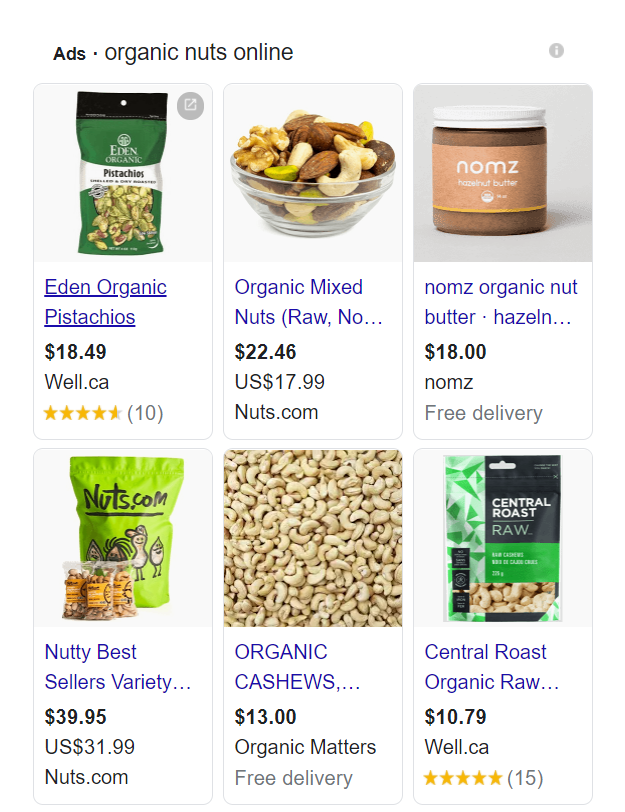
Similar to SOPPC 37, this week’s installment applies as much to broader business strategy as it does to close-up PPC execution. But company names – or even more specifically, domain names for company websites – do have a direct impact on a user’s cognition, trust, psychology in general, etc., over potentially millions of discrete interactions per year. So although this “naming thing” sounds like a subjective, sweeping strategic debate, there’s a highly technical, down-in-the-weeds element to it as well. It’s unwise to ignore the importance of root-level user experience principles.
An obvious counter-example of “what not to do” came in the form of a client we still work with today. For years, this company used a five-word, twenty-four letter domain name ending in .net. Originally this name fluked into some high rankings in Google Search (and earlier search engines) due to the propensity of search engines, at times in 1997-2002, to reward “keyword-rich” domain names. The strategy had long run its course when we rebranded to a two-word, 11-letter .com name that functioned and resonated better in every way. Two versions of the name cost $5,000 in total to acquire. It was money well spent.
Let’s take some vanilla examples from my “iconic Canadian brands” world. Say you’ve spent years, decades, or even a century building a brand most of your target customers have heard of. You’re likely going to wind up with a domain name that’s totally intuitive to the consumer. Lululemon goes with lululemon.com, Harry Rosen gets harryrosen.com; Canadian Tire gets canadiantire.ca (no .com for Canadian Tire!). This all falls into no-brainer territory.

Figure 1: As Steve Krug famously said about website stuff: “Don’t make me think.” This domain name is unproblematic: it matches a business name that is easy to recall. The worst thing you can do is to confuse or befuddle the consumer.
The technical side of it is, these URL’s show up as the Display URL in many ad listings and appear in the address bar in the browser. Stuff that has been part of most everyone’s world since the 1990s.
If a domain name isn’t available, as many entrepreneurs know, you need workarounds. At the naming stage of your company, if it’s very new, you might be considering domain name availability as well.
If you can avoid non-standard, “workaround” names, so much the better. It can give the customer a feeling like “you weren’t OG enough to get the good name,” or even “who is this imposter?” That being said, consumers are a bit more open-minded now. Legions of new DTC (direct-to-consumer) ecommerce businesses are taking advantage of the huge explosion in available TLD’s (top-level domains), so “dot com or bust” isn’t as acute a worry for new businesses as it once was.
But certainly, the use of .net and other “alternative to .com” names was seen by some as “second best” in years gone by. Hyphenated names sometimes make it seem like you were forced into a workaround by another business or domain squatter. Here at Page Zero, we bought pagezero.com years ago from a domain squatter for a few thousand dollars, gratefully retiring page-zero.com.
A new business should think a bit about which name to choose, and at the same time, which domain will go along for the ride. Unique names are certainly important for many of us, in terms of the realities of corporate registration, something that won’t cause consumer confusion, and so on. If you have a business that is, say, an acronym that is shared by a dozen other businesses and even common phrases, you may be stuck with that. If you get the chance to choose something fresh, now’s the time to choose well.
For example, my friend Marc started a new DTC business that sells a therapy device for injury rehabilitation (red light therapy). The domain name he chose was intuitive and short: rouge.care. Note the bold and unusual choice of TLD: the .care extension. I was actually sitting with Marc (and no doubt offering my opinion) as he went through lots of naming options and domain name options. If I had disagreed strongly with rouge.care, I’m sure we would have arm-wrestled.
Later, Marc seems to have added a wrinkle. Because he’s based in Montreal and the Canadian market is important to the company, a separate site was created at rougecare.ca. Global sales go with a generic TLD, and local sales get the Canadian moniker. Sometimes such detail comes into play when factoring in trust, personalization, and ROI on paid ad investments.
Anyway, for a new business or one that is “not too late to rename,” consider the advantages of a great name. These range from long-term thinking (strategy) to down-in-the-weeds cognition, CTR’s, conversion rates, recall, etc. – which may provide a boost to ROI for more measurable reasons.
I’ll break these down into three main factors:
- Positioning / brand
- Recall and other cognitive issues that may help online behavior metrics
- “Swagger factor.”
1. Positioning / brand
There is a lot to be said for the art of positioning a business, and the subject is endlessly complex. Oftentimes, a business decides to address a niche market and then expands to an enormous size. Companies like Facebook, FedEx, and Under Armour would be examples of this.
We used to learn about the murky art of positioning from books. Those books were updated. For example, an “updated” version of the Ries and Trout classic on this subject was released in 1997. Seth Godin released All Marketers Are Liars in 2005, later redlined to reflect his real meaning, “All Marketers Tell Stories”.
Ries and Trout are partial to the idea that positioning helps to be “top of mind” in your category. That made sense for a long time. The old “you associate the category with one brand, possibly two – Hertz is #1 and Avis is #2 so Avis tries harder” thing. That logic still works in some cases: people want a Peloton, period. But I like National Car because I perceive other rental car companies to be expensive and hidebound.
When it comes to consumer products, fast fashion took hold in many realms, including food and cosmetics.
And positioning experts suggest that consumers connect with you via physical locations – it helps to “be from somewhere.” I think that’s undeniably helpful for craft beer, etc., but utterly unimportant for remote-first tech companies like Automattic, the creators of WordPress. Famously, Shopify recently bristled at the requirement of old press release companies to include a dateline (“OTTAWA, ON, CANADA—“) with a release, so they went with a local press release company that lets their press releases be located anywhere/everywhere/nowhere.
The positioning conundrum in digital businesses and ecommerce is a subtle and fast-changing one. In general, whoever your audience, it just helps if you seem to “get it.”
Let’s take a major case study (major in my mind).
Famously, a former client of ours made the bold choice to rename from NutsOnline.com to Nuts.com. It was becoming evident that longer term, the “online thing” was going to look dated – like “America Online.” Obviously, an online business is online. Expedia isn’t TravelBookingsOnline, Zappos had been shoesite.com (and/or .net) before Tony Hsieh made it over, and Amazon didn’t call themselves placetobuybooksontheinternet.com. (Certainly, name extensibility may help, to not be pigeonholed into a single product or service, but there are exceptions here, as usual.)
From a positioning standpoint, step 1 in the NutsOnline decision to rebrand was just to ensure that they had a smooth-seeming identity that reflected a nimble, contemporary view of selling stuff, you know, online.
Jeff Braverman, the CEO of Nuts.com, bemoaned the fact that they got great PR on a TV cooking show, but the host actually called them Nuts.com instead of the unwieldier NutsOnline.com. In those days, 2003-2011 or so, it was common to hear a recommendation to grab a domain that you could “read on the radio” and not have it misinterpreted or misspelled. That’s a good recommendation even absent a radio spot. It comes down to easy recall, as we found.
This makes sense even if you’re trying to explain something to a friend over the phone – say, by spelling it out. That’s a quick one if you only need to get through four letters. “November, Uniform, Tango, Sierra… DOT COM” and you’re done.
2. Recall and other cognitive issues that may help online behavior metrics
Ease of recall very much comes into play for the second reason for getting a great name: cognition across realms and across time. By across realms, I mean there is word-of-mouth, different ad channels, etc. Next thing you know, someone’s – yep – trying to remember that name, typing it into the address bar of their browser, or speaking it into a phone. Doesn’t help a whole lot if they can’t remember it or get it wrong.
Cognition extends to all the little metrics related to ad performance in our world. How often something gets clicked. How easy it is to read everything else around the name when reading quickly. And of course how pleasing the name may be. Shorter names seem to do well on all counts.
If two million or two hundred thousand people might encounter your domain name for the first, second, or third time this year, think about how much of a drag it might be if that encounter doesn’t go well.

Figure 2: Is it just me, or do short names seem to do well?
So, this also spills over into how easy it is to scan a name when reading it in the Display URL of an ad. The less cognitive load (even subconscious) we impose on users, the more likely they’ll find transacting with us easy.
Positive signals of normal user interactions might well spill over into ad Quality Scores (that spill over into higher ad positions for better CPC’s, all else being equal).
Brevity isn’t the only thing in the world, of course. Differentiation plays into this as well. Any number of companies could have easily registered “foodstuffsontheinterwebs.com” and all manner of interchangeable, uninteresting names. There’s only going to be one Nuts.com. That one’s hard to argue with.
If you’ve bought apparel a couple of times from lululemon, it’s unlikely that you’ll forget who they are.
So odd names like Zappos and Amazon, in hindsight, have worked quite well. Many great names happen almost by accident. But in hindsight, brevity, differentiation, positioning, “getting it,” etc. all play a role in catching hold and leading to smooth and repeated transactions.
3. The Swagger factor
The “swagger factor” is another thing to consider. It’s sort of like differentiation married with excess confidence. In acquiring Nuts.com, Jeff Braverman injected a certain je ne sais quoi into the business that vaulted them into the status of a category leader. In part, it’s differentiation in the sense of being “the one and only” or “the original.” That’s classic positioning, like Coke (The Real Thing). And it follows the wisdom Seth Godin illustrates in his classic post Beauty as a Signaling Strategy. In evolutionary terms, peacock feathers and so forth are wasteful – more than is needed for survival. That signals an excess of good health.
In business terms, subtly showing off is a way to signal that your business is so healthy and fit that it can afford to “look good” with vanity items.
Trillions of dollars are spent on cosmetics and home improvements that make utterly zero functional contribution to people’s faces or driveways. (Personally, I’m partial to a green lawn.) And that stuff is low stakes in many ways! So why wouldn’t we apply the same logic to a business? Image matters. Design often matters. Naming matters, too.
I won’t say what Nuts.com paid for that domain name, but it’s a lot more than you’re imagining. It almost seems like a wasteful number. I should know: I thought a number 30% of the real price might be wasteful, and advised Jeff to think twice and to consider deploying his budget elsewhere.
Ultimately, that change paid for itself many times over. It was fully paid back within about 18 months. A long time to pay back an investment perhaps, but not if you’re thinking long term. Think of the alternative: the potential to run into a sea of similar competition and just sort of drift aimlessly into irrelevance. Jeff Braverman saw that future, and decided on a better one.
It’s hard to prove everything in a cut-and-dried fashion, but the new short name helped the appearance of our PPC ads, the Quality Scores associated with the domain, etc. – I’m fairly certain of that. But the most obvious contributor was how much new direct traffic they were getting. The name was just so easy to spread and remember. Much more so than the original. In the ensuing months and years, Direct Traffic and brand name searches for the company name jumped up to be a significantly higher proportion of annual sales than previously. And, as with other short-named clients we’ve worked with, like well.ca, every year more and more people I asked had heard of our client and had bought products from them.
On top of everything else, a lot of people I’ve mentioned Nuts.com to (or even sent gifts to) get a little giggle out of the name. Recall factor increases even more from the giggle.
Yep, I may have developed a cargo-cultish superstition about short, memorable names as an aid to success in some online verticals. But I think there’s a lot to it.
Read Part 44: How Google Ads Makes Narrow Geotargeting Easy